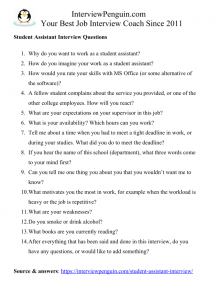It’s always nice to see when students try to do something extra for the campus community. Working as a student assistant, you’ll get a chance to regularly interact with fellow students and their parents, you’ll get to know some of the educators or administrative workers from the University, and you will also have something on your resume, some working experience, once you earn your degree and will apply for your first job–which is definitely an advantage.
Being enrolled in one of the study programs at a college is typically the only requirement for application. But more students will always apply, and whether they hire you or someone else for the position depends on your answers to their questions. And of course on the impression you manage to make.
Let’s have a look at some questions you may face while trying to get this interesting role.
Table of Contents
Why do you want to work as a student assistant?
You can basically repeat the things I just mentioned–to help fellow students and educators, to actively contribute to the college community, to get to know some educators, and perhaps earn your first working experience.
But you can say also something else. For example if you struggle with bills and need to earn some extra cash in order to be able to continue your studies, it’s a good enough reason to apply. Though it shouldn’t be the only one, you shouldn’t apply only to earn money.
You can also mention a few strengths you have–such as strong communication and administrative skills, ability to work quickly with MS Office, and so on. Simply things that will make it easier for you in the job.
How do you imagine your work as a student assistant?
This question is a bit tricky, because what exactly you will do depends a lot on your supervisor, and also on the number of student assistants that are already working at the department/college.
One thing is certain: you won’t work more than 20 hours. But that’s the only certain thing :). Whether you will type something to MS Office, or help students with some forms and applications, or manage displays and bulletin boards, or answer questions of new students by phone and on email, is hard to say.
Read the job description carefully, and, if you can, consult one of the existing student assistants, or one who had this job before with the same supervisor. They should be able to tell you more about the job, which will allow you to show realistic expectations in an interview. And that’s the most important thing…
If you aren’t sure, however, or the job description is very basic, you can simply say that you’ll take care of any duties the supervisor assigns to you, and will also proactively look for ways to help either the educators or the students.
How would you rate your skills with MS Office (or some alternative of the software)?
Do not just say that you are excellent, or average, or whatever. Elaborate on your answer, saying how long you’ve been working with the software, and what principal functionality you have used.
For example you can say that you’ve been preparing presentations with PowerPoint (for school), did some calculations and charts with the help of MS Excel, and wrote countless pages with MS Word.
If they ask about a specific software you have no experience with, you should ensure them that you are tech savvy, and are sure that you will learn to work with any software that they have in place in short time.
A fellow student complains about the service you provided, or one of the other college employees. How will you react?
Ensure your interviewers that you will take feedback from each student seriously. You will carefully listen to their words, and try to identify the mistakes you made. Either you did something wrong, or they misunderstood you, or they expected something you couldn’t really provide at first place.
In any case, you will try your best to remedy the situation, and you will also try to learn your lesson, understanding what you did or communicated in a wrong way, to ensure the same case won’t repeat again. That’s the attitude they expect from a good job applicant.
What are your expectations on your supervisor in this job?
Here you have two options for a good answer. First one is saying that you expect a lot from one person only–from yourself. Surely the supervisor knows what they are supposed to do, and how to instruct you in your job. You won’t be the first student assistant they supervise after all… Therefor you prefer to focus on your role, and do not expect anything from them.
Another idea is saying that you expect an open communication, and an honest and constructive criticism. It will help you to improve in your job, and that’s exactly what you are striving for.
Special Tip: Download all questions in a one page long PDF, print it, and practice your interview answers before the start of your interview:
What is your availability? Which hours can you work?
I suggest you to prepare schedule for an entire week, clearly specifying when you can help them out. Of course, your studies come first, and you should never neglect them for the job.
You can also have one or two extracurricular activities, also extremely important for you, but besides them the job of a student assistant should have a priority…
The message I try to convey here is that if you tell your interviewers that Monday afternoon you play basketball and then go to sauna with your friends, and Tuesday you play cards in the dorm and go to cinema, so you can work only Wednesday and Thursday, they won’t hire you.
You should give this job a high priority–not necessarily the highest, but it should be there close to the top of your list.
Other questions you may face in your student assistant interview
- Tell me about a time when you had to meet a tight deadline in work, or during your studies. What did you do to meet the deadline?
- If you hear the name of this school (department), what three words come to your mind first?
- Can you tell me one thing you about you that you wouldn’t want me to know?
- What motivates you the most in work, for example when the workload is heavy or the job is repetitive?
- What are your weaknesses?
- Do you smoke or drink alcohol?
- What books are you currently reading?
- After everything that has been said and done in this interview, do you have any questions, or would like to add something?
Your non-verbal communication matters
Let’s put things straight: Student assistant is not a difficult job. After some training, everyone will learn how to handle the duties. That’s why personal preferences play an important role in this interview. Of course, you cannot remain silent when they ask you their questions. But as long as you come up with some decent and logical answers, you’ll make the cut.
What decides at the end are often the personal preference of your supervisor. Do they like you more than the other applicants? Did they feel good with you in the room? Did you talk to the point, and did you seem to understand their questions and instructions.
Needless to say, you should try to make a good connection with your interviewer(s). Learn something about them, keep an eye contact, inquire about their academic career if you get a chance, and try to bring some positive energy to the room.
Once they enjoy your company and feel that the two of you will get along really well in work, they may even prioritize you over some other applicants who have more experience…
Dress appropriately, and do not be afraid to look good
Your skills, motivation, and attitude matter, and of course the connection you manage to make with your new supervisor. At the end of the day, however, it’s nice to have an assistant that looks good. It’s just easier for an eye, if you know what I mean.
Hence you should dress professionally (at least business casual, or a longer dress if it’s hot), but you should not restrain from clothes you look attractive in. It doesn’t mean that you should flirt with your interviewer or anything similar. But looking good and smelling nice can only help you in this interview (and in many other interviews as well). Do not forget on this part of the puzzle, since each detail counts when many people apply for the same position.
Conclusion, next steps
Working as a student assistant is a great way of widening your network of contacts at the college, earn some extra money, and learn something new. It’s a popular job though, and you will often compete with many other students for the position. That’s why it is important to do everything right.
Prepare for the questions you may face, and learn as much as you can about your future supervisor and about their academic career. Do not forget to be nice and friendly, keep an eye contact, ask questions, and show honest interest for the job. You can also experiment with some nice clothes, if you feel that such things can work on your interviewer. I wish you good luck!
Matthew
May also help you:


